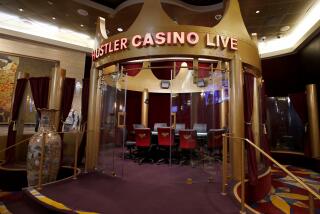Book Review : ‘Tap City’ Tosses Thin Plot Into the Pot
- Share via
Tap City by Ron Abell (Little, Brown: $15.95)
Fifty poker players--a varied lot by wealth, background and experience--gather from around the country at the Taj Mahal Casino in Reno for a three-day, seven-card-stud poker tournament. The host is the legendary cowboy-gambler, Stretch Jackson. (He bears close resemblance to real-life gambler Amarillo Slim Preston). Each player buys in for $10,000. Six will eventually share a piece of the half-million dollars in prize money.
Ron Abell’s first novel has the structure of a murder mystery: Put a limited number of antagonists around the poker table (or dinner table), and try to guess who will be eliminated (or killed) and who will emerge victorious.
Novels about gamblers and gambling, this one included, usually run into the dual problems of realism and allegory. Larger-than-life characters, unbelievable winning streaks, improbable winning hands and the overuse of gambling jargon all contribute to a sense of more make-believe than reality.
The final stretches of most high-stakes poker tournaments are deadly silent and serious. Because this would not make for good novel reading, Abell presents us with noisy dealers and players, delivering a quip or a needle or a card-room cliche after every hand.
There are also some technical quibbles here: the imprecise stakes of the game, the strategies of play, the number of players at the final table (nine, in a seven-card-stud tournament).
The second problem--the allegorical leap--is more difficult to present. Gambling is supposed to be the backdrop, the medium of discussion to talk about the things that really matter: human relationships. The dust jacket says so. As it turns out, Abell has made the leap only halfway. As a reader, I cared more about the outcome of the poker tournament than who got along with whom, or didn’t.
This book follows its main predecessor, “The Cincinnati Kid.” But while the main characters there, the young man and the old pro (Steve McQueen and Edward G. Robinson in the movie), stick with us because of their contrasts, this book has too many major characters to care about. What we know about them are their wisecracks and fantasies, not the depth of their emotions and motivations.
This is a new and difficult genre, for the real world of high-stakes poker tournaments is invisible: the ploys, the silent agreements, the backers and the friendships.
Much to his credit, Abell is obviously a poker player himself and a keen observer of the ever-growing tournament scene. Writing successfully and realistically about this hidden subculture is probably a task more difficult than winning a tournament itself. “Tap City” gets us to the last table: That is more like a promising start than a first-place finish.
More to Read
Sign up for our Book Club newsletter
Get the latest news, events and more from the Los Angeles Times Book Club, and help us get L.A. reading and talking.
You may occasionally receive promotional content from the Los Angeles Times.








